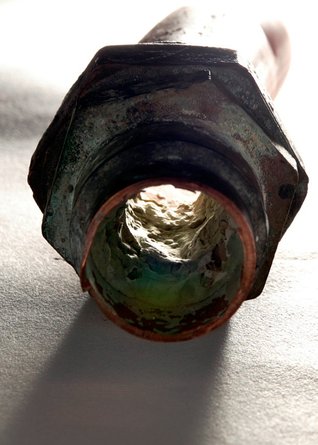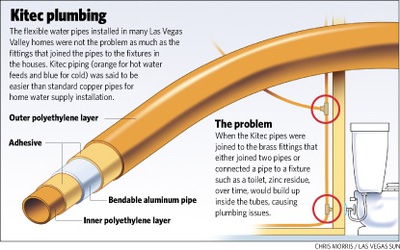
The faulty Kitec water pipe fitting taken from the home of Bob and Joanne Eckhardt has corroded, causing declining water pressure and leaks.
Sunday, March 23, 2008 | 2 a.m.
As many Southern Nevadans know, anyone who moved into a new home here in the past 10 years could have water pipes that are corroding and, in some cases, might explode.
Reports of faulty Kitec fittings first surfaced at the McDonald Ranch residential development earlier this decade. The discovery raised concerns for homeowners across the Las Vegas Valley, but few could have foreseen the enormity of the problem as it stands today.
Civil attorneys now estimate that at least 31,000 homes in hundreds of Clark County subdivisions need new fittings. What’s more, although the Las Vegas Valley appears to be the epicenter of the problem, tens of thousands of homes across the Southwest and stretching north into the Sacramento area also apparently need repairs amounting to roughly $7,000 each, say attorneys and homeowners following the issue.
Class action lawsuits are pending against the manufacturer and plumbers in Las Vegas and Albuquerque, N.M. Others likely will be filed soon.
William Ferguson, an attorney representing New Mexico residents, says Kitec is found chiefly in upscale tract homes there built by several national builders, including multibillion-dollar corporation Del Webb Communities. A San Francisco-based attorney is preparing related suits in Los Angeles and Sacramento. The problem allegedly persists in many parts of Texas, in burgeoning communities in Maricopa County, Ariz., and around Tucson, homeowners, plumbers and lawyers say.
In Clark County, the problem is especially acute in senior communities. To buyers, sun-drenched subdivisions in the arid West seemed preferable to the Floridian communities draped in dampness: Small and tidy ranch homes dot slightly sloping hills, often overlooking the dazzling Las Vegas Valley that sprawls below like spaghetti. Shangri-La is just a drive downhill.
Some owners who left town for a few days, however, have returned to foot-high floods causing pipe, wall and floor damage in excess of $100,000. More common are leaks and declining water pressure — all caused by the faulty brass plumbing fittings, according to the lawsuits filed in Nevada and New Mexico.
•••
By now, many homeowners in the Southwest can define with expert clarity the word “dezincification,” the process that corrodes the brass fittings.
Some have visuals. Summerlin residents Robert and Joanne Eckhardt keep their Kitec fittings, residue still thick inside, in a cabinet in their garage.
Yes, dezincification sounds like something out of Mystery Science Theater, but it’s a fairly straightforward process. As water goes through the fittings it corrodes the metal; zinc leaches from the brass and creates a powdery buildup inside the fittings. It’s called, in science parlance, “meringue.”
“I don’t think you want to put it on top of a Coke,” says attorney Randall Jones, whose firm, Harrison, Kemp, Jones & Couthard, represents the thousands of Clark County homeowners with Lynch, Hopper & Salzano, also of Las Vegas.
If the fittings aren’t replaced, the swelling leached zinc particles eventually clog the pipe, causing decreased water pressure, leaks and even burst plumbing. Replacing the fittings usually means replumbing the house, at a cost of $6,000 to $8,000. Afterward, a perplexing new situation often emerges. The old pipes were in the concrete foundation. To save money, the new ones have been installed above the ceiling. In scorching summer months, you need to run the water a long time before it turns cold.
The maker of Kitec, Canadian manufacturer IPEX, contends the cause of the problem here is the valley’s hard water, which comes from the Colorado River. James Carroway, IPEX’s Las Vegas-based attorney, maintains that other states drawing water from the Colorado River mix it with softer water from other sources — and thus won’t see the effects of dezincification for about 50 years.
That means lawsuits filed in those states are without merit, Carroway says. “They see this big class action going on in Las Vegas and they want to try to make a fast buck.”
Dave Birka-White, attorney for homeowners with Kitec in California, acknowledges climatic differences may hasten dezincification in Clark County, but says he has seen corroding Kitec fittings in Mission Viejo, Calif., and outside Sacramento.
“These are progressive failings,” Birka-White says.
The water in most Southwest communities, including 1.4 trillion gallons pumped annually into Southern California, is derived from the same source: the Colorado River, notes J.C. Davis, a spokesman for the Southern Nevada Water Authority.
•••
The exact number of homes with Kitec water pipe fittings is difficult, if not impossible, to pinpoint. Many homeowners will discover the problem but not know its cause.
The Clark County suit alleges Westmark Homes, American Premiere Homes and Development, Concordia Homes of Nevada, Signature Homes and Nigro Development are among the developers that used the Kitec fittings.
The recent wave of suits began here in 2006 and now includes homes built by 31 developers from the late 1990s through 2006. The largest class action suit in Clark County unites at least 31,000 homeowners. A similar suit filed last year in New Mexico represents 30,000 homes there. The scope of the problem in California is still being determined, says Birka-White.
The targets of the suits include IPEX, homebuilding companies and plumbing contractors that installed it. The primary objective is to compel the defendants to replace the Kitec fittings and compensate those homeowners who already paid to do so.
Increasingly, nervous homeowners are hiring plumbers for inspections, Jones says.
Plumbers bore small holes under sinks, then use an instrument with a flexible arm to help them identify Kitec fittings. They say the solution requires replacing roughly 10 Kitec fixtures in each home, usually found behind all sinks, toilets and showers. It’s a project that generally takes plumbers at least two days to complete.
“They have had to learn how to cut the walls,” says Bob Eckhardt, 77, of Sun City Summerlin. “By the time they got to us, they had it down to a science.”
Eckhardt and his wife are convinced the piping in their 1,400-square-foot duplex would have exploded had they not discovered that something was wrong while replacing the tile in their hallways and bathroom. There had been no hint of trouble until Joanne Eckhardt felt water in the tiny space between the wall and where the toilet usually sits.
It cost them $7,775 to replace the Kitec fittings.
“Everybody’s in the same boat,” Joanne Eckhardt says matter-of-factly. “It’s good conversation over the bridge table.”
•••
Ironically, early versions of Kitec were heralded as resistant to corrosion and pressure. The American Hardware Manufacturers Association in Chicago gave IPEX an award for developing the fitting; a building and materials group in Canada did the same a year later.
Plumbers perceived Kitec as more durable than its predecessor, copper. Kitec was particularly popular from 1998 through 2005, but plumbers based in Las Vegas and Phoenix say it was sold through early 2007.
Recent litigation halted its further widespread use, though an earlier suit filed by more than 1,000 homeowners in Del Webb-built Sun City MacDonald Ranch didn’t deter developers from continuing to use the Kitec fittings.
•••
The Eckhardts, who are from Cleveland, don’t regret their decision to move to Nevada instead of a popular retirement community in Florida. But many of their peers have had second thoughts.
Large swaths of the walls in Bernay Scott’s kitchen have yet to be repatched; a picture of one of her two dogs hides the signs of a wall breached by plumbers to replace Kitec. Scott, 61, works three days a week and is a full-time caretaker for her husband, William, who has lung disease. She says she is struggling to pay off the debt on her replumbing. “It’s not like I had $7,600. Believe me, I don’t,” she says. “It’s sickening. It’s unbelievable.”
She’s pessimistic about the lawsuit’s prospects.
“Where will the money come from?” she says. When “somebody puts money in my hands, that’s when I’ll believe it.”
Del Webb, the developer of the Sun City retirement communities, has agreed to pay 2,700 homeowners in the Anthem subdivision settlements of $7,800, amounting to about $21 million.
Those settlements are in limbo at the moment, however; a District Court judge invalidated them, arguing they interfered with the larger class action lawsuit. A decision by the state Supreme Court is pending.
Last month Harrison, Kemp, Jones & Couthard, in a $10.2 million class action settlement, agreed to replumb 1,200 homes built in Las Vegas by Richmond American Homes of Nevada. It’s the first settlement in Clark County since the lower court filed the newest Kitec class action suit in October 2006. Attorney Jones declined to address any discussions with any of the other 30 developers in Clark County that used the Kitec fittings, though his co-counsel says an agreement with a small Las Vegas-based builder appears imminent.
Cy Ryan, the Sun’s Carson City bureau chief, and Sun librarian Rebecca Clifford contributed to this report.


Join the Discussion:
Check this out for a full explanation of our conversion to the LiveFyre commenting system and instructions on how to sign up for an account.
Full comments policy